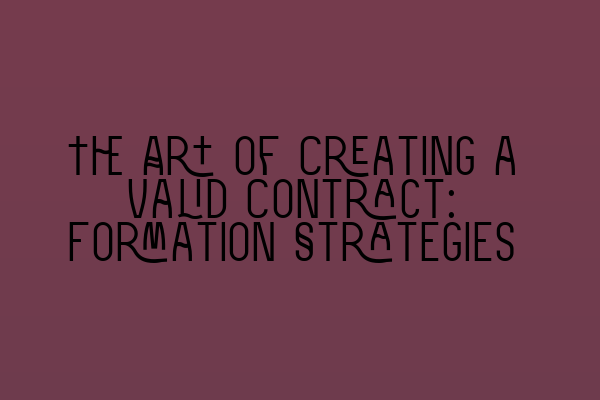The Art of Creating a Valid Contract: Formation Strategies
A contract is the backbone of any business transaction. It sets out the rights and obligations of the parties involved and provides a legal framework for resolving disputes. As a solicitor, it is crucial to understand the art of creating a valid contract and the formation strategies that ensure its enforceability. In this article, we will explore the key elements of contract formation and provide valuable insights to help you navigate this legal terrain.
1. Offer and Acceptance
The most fundamental element of contract formation is the offer and acceptance. An offer is a clear expression of willingness to enter into a contract on specific terms. It must be communicated to the offeree, who then has the choice to accept or reject the offer. Acceptance occurs when the offeree agrees to the terms of the offer without any modifications. It is important to note that silence does not usually constitute acceptance, unless specified otherwise in the contract.
To ensure the validity of the contract, it is essential to clearly define the offer and its terms. Ambiguity can lead to misunderstandings and potential disputes. Therefore, precise drafting is crucial, and any terms that are material to the agreement should be explicitly stated.
For example, if you are creating a contract for the sale of goods, you may want to include specific details such as the quantity, price, delivery terms, and payment terms. This level of specificity reduces the risk of disputes and provides clarity for both parties.
For more information on contract law, you may refer to our article on SQE 1 Practice Exam Questions.
2. Consideration
Consideration is an essential element of a valid contract. It refers to something of value that is exchanged between the parties. Consideration can be in the form of money, goods, services, or even a promise to do or refrain from doing something. It is the basis for the mutual obligation and benefit that characterizes a contract.
Consideration ensures that a contract is not one-sided or gratuitous. Both parties must provide something of value to make the contract enforceable. For example, if you are drafting a consultancy agreement, the consideration may be the payment of a fee by the client in exchange for the services provided by the consultant.
It is important to note that consideration does not need to be adequate or equal in value. However, it must be sufficient to have legal value and be something that is bargained for.
To further enhance your understanding of contract formation, we recommend reading our article on SQE 1 Practice Mocks FLK1 FLK2.
3. Intention to Create Legal Relations
For a contract to be valid, there must be an intention to create legal relations between the parties. This means that the parties must have a mutual understanding that their agreement will be legally binding. In most commercial transactions, there is a presumption that the parties intend to create legal relations. However, this presumption can be rebutted if the circumstances indicate otherwise.
It is advisable to include an express provision in the contract stating that the parties intend to create legal relations. This helps eliminate any ambiguity and reinforces the enforceability of the contract.
In some cases, parties may enter into agreements that are not intended to be legally binding, such as social or domestic arrangements. In such instances, the agreement may not be considered a valid contract, and the parties may not have legal recourse if one party fails to fulfill their obligations.
To learn more about contract formation and its implications, you can refer to our comprehensive article on SQE 2 Preparation Courses.
4. Capacity and Legality
Another critical aspect of contract formation is the capacity of the parties and the legality of the contract. Capacity refers to the legal competence of the parties to enter into a contract. In general, parties must have reached the legal age of majority and be of sound mind. Contracts involving minors or individuals with mental incapacity may be voidable or unenforceable.
It is crucial to ensure that all parties have the legal capacity to enter into the contract. Any doubts regarding capacity should be addressed before proceeding with the agreement to avoid future complications.
Moreover, a contract must be legal in its purpose and not contrary to public policy. Contracts that involve illegal activities or have unlawful objectives are considered void and unenforceable. It is important to ensure that the contract complies with all applicable laws and regulations.
If you are interested in understanding the implications of capacity and legality in contract formation, we recommend reading our article on SQE 1 Preparation Courses.
Conclusion
Creating a valid contract requires careful consideration of various factors, including offer and acceptance, consideration, intention to create legal relations, capacity, and legality. By understanding these elements and implementing effective formation strategies, you can ensure that your contracts are enforceable and provide a solid legal framework for your business transactions.
For more information on contract law and additional resources to prepare for the SQE exams, please visit our website at SRA SQE Exam Dates.
